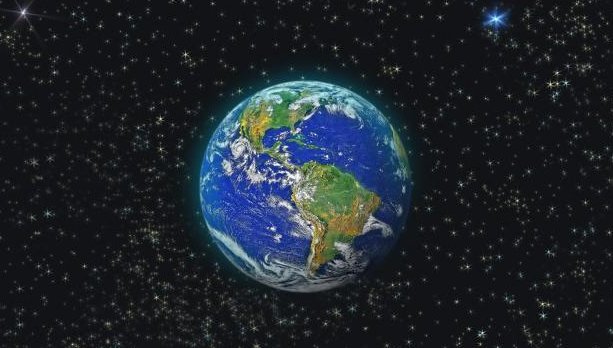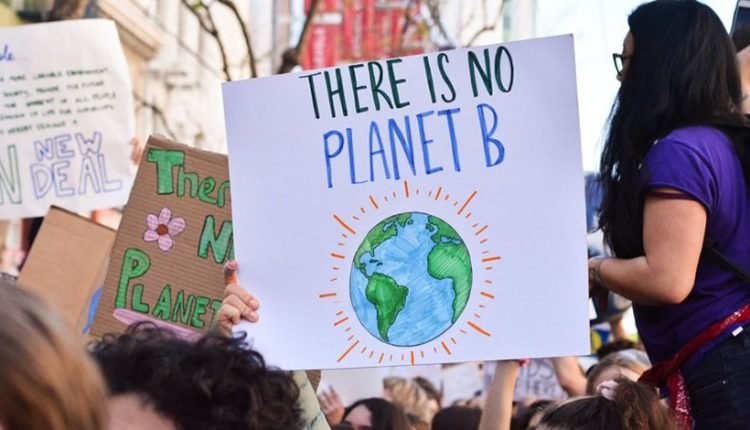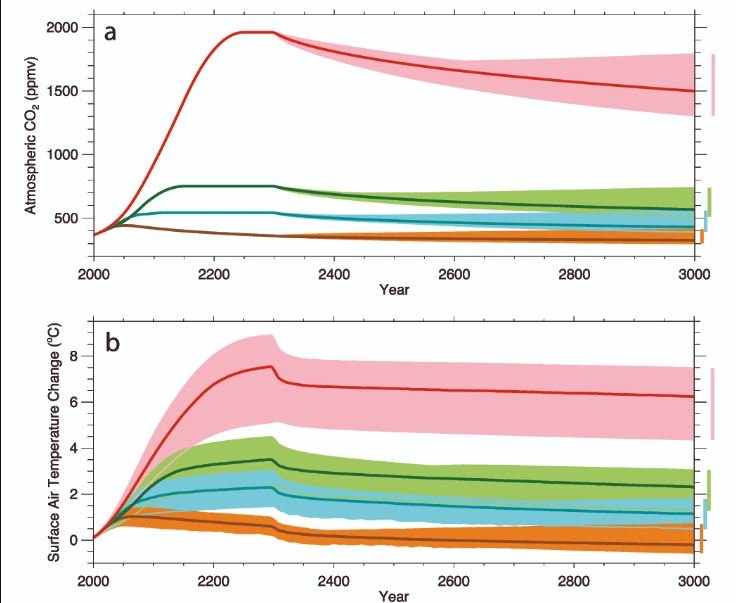It is commonly admitted that climate change is the biggest challenge facing humankind1
"Climate change" is a profound, long-term alteration in the weather conditions across the Earth including significant changes in average temperatures and hard-to-predict modifications in the patterns of precipitations and other natural phenomena.

source
Climate change being an objective, observable phenomenon, it is not disputed that the challenge it raises should be addressed with the tools of reason and science rather than those of emotions or faith. Yet given the nature of humans, emotions and faith cannot be expected not to interfere. One of the most vivid illustrations is the "Fridays for Future" movement which is a manifestation of strong emotional energy with little to no rational or scientific contribution to the matter at hand.

While "rising the stakes" in emotional terms, the "Fridays for future" contributes little to nothing to finding rational solutions to the problem it wants to see addressed
The goal of this paper is to analyse rationally the problems climate change poses and identify where solutions might be found.
Among others, we should consider the following aspects:
- Scientific bases of climate change
- How did we get here?
- What are possible actions we could be taking to address the problem?
- What are the worst case scenarios in case we ignore the problem?
- What are possible fall-back solutions in case we fail?
Some thermodynamics
If we are tackling the problem of climate change with a scientific approach, we should first acknowledge the fundamental laws of nature:
- The 1st principle of thermodynamics - conservation of mass and energy
- Very important for the matter at hand, the 2nd principle of thermodynamics: the continuous increase in entropy
As concerns the balance of mass and energy, it should be observed that Earth is a system which, due to its gravity, exchanges relatively little mass with the surrounding space. A notable exception is methane, a potent "greenhouse gas" (GHG) which is lighter than air and tends to escape the atmosphere.
In terms of energy, Earth was at a relative equilibrium, radiating back to space most of the energy it received from the Sun. Until human activity began to change the composition of the atmosphere, that is. An increased concentration of GHG makes the Earth retain more of the solar energy it receives and thus grow gradually warmer.
The implications of the 2nd principle of thermodynamics are usually harder to understand, also because "entropy" is a more abstract concept than "mass" and "energy". "Entropy" is usually explained as the "degree of chaos" - the more chaotic a system is, the higher its entropy is said to be. The entropy of a system increases with temperature. If we think of a flask of gas, as the gas temperature increases, the faster and more chaotic the movement of gas molecules inside the flask becomes - which implies a higher entropy.
Keeping in mind the 2nd principle of thermodynamics is essential in defining a climate policy
But why?
Remember that we deal with "heat" and "disorder" - this is precisely what "entropy" is about. The 2nd principle of thermodynamics explains that, given an isolated system, its entropy tends to increase over time. In other terms, for a given system to keep its entropy constant or even decrease it, it should exchange mass and/or energy with its surroundings so that the bigger system composed of our initial system and its surroundings can increase its total entropy.
Because "entropy" is a rather abstract concept, we'll approximate it with "heat" or "temperature".
This is best illustrated by a physics problem I first heard when I was 17:
A fridge is plugged into the grid and let to function in a an otherwise empty, adiabatically isolated room. The door of the fridge is left wide open. What will happen to the temperature of the room:
- will it decrease (because of the fridge working with its door open)?
- will it stay the same?
- will it increase?
- any of this can happen, depending on the efficiency of the fridge?
- any of this can happen, depending on the relative sizes of the room and refrigerator?
We cannot answer that question right away, can we? It depends on how performant the fridge is, right?
Wrong. No calculation is needed.
Given that the room cannot exchange heat with its surroundings ("adiabatically isolated") and that it receives through the power cord electrical energy from the grid, the first principle of thermodynamics teaches us that the energy of the room will increase, and the second principle, that its entropy will increase too. This is basically the same as saying that the temperature of the room will increase, no matter how performant the fridge is at cooling, and no matter its size relative to the room.
Now let's make an analogy between that problem and our Earth, which receives energy from the Sun. If the Earth becomes more / better isolated (due to the GHG), then we'll be in the same situation as the room in the above problem: the temperature of the Earth is bound to increase.

The Earth receives energy from the Sun just like the fridge in the image above receives electricity from the power cord.
As GHGs gradually increase its degree of insulation, the average surface temperature is bound to increase
Corollaries
With the above information, we are ready to infer two corollaries
One planetary system
First of all, we need to realize that "we are all in it together". The atmosphere doesn't care about country boundaries. A ton of CO2 emitted in, say, China is going to play, in the economy of climate change, the exact same role as a ton of CO2 emitted in the US or in India or in Africa or in Europe. Which logically means that if Europe emits X tons of CO2 less but Africa or Latin America emits, during the same period, X tons more, the net result will be nul - we, as a planetary system, would not have made an ounce of progress toward the goal.
Additivity
Another important aspect to consider is the additivity. The more GHGs (CO2 in a gross approximation) there is in the atmosphere, the better our system is "insulated" - the less heat is released in the outer space so the faster the average surface temperature will increase. As long as we don't deploy efficient "GHG scrubbing" systems at scale, each and every ton of CO2 emitted will make the insulation better (and our problem worse) for at least a ... very large number of years (hundreds, or even thousands).
You can also think of this as a "GHG budget" - it doesn't matter who consumes it (who emits GHG) whether it's India or China, once the budget is "spent" the average temperature of the Earth surface will increase accordingly for a very long period of time.
Possible solutions
What does this mean, what are the possible solutions?
- Stop emitting GHGs and wait for those already in the atmosphere to slowly leave the atmosphere.
- Find an artificial way to radiate (send back to the Universe) more energy than we do now (given the increased level of GHG in the atmosphere). This is one of the "geo-engineering" paths.
- Find an artificial way to remove GHG from the atmosphere (faster than we emit them)
- Try to adapt to a changing climate
- Try to hedge our bets by establishing a foothold on a second planet
Note that those listed above are not mutually exclusive and they can all contribute to a global solution, to a certain extent.
However, let us observe right away that the "additivity" aspect above implies that we should probably devote a lot more attention and energy to solution 4 than we are doing now!
4.Try to adapt to a changing climate
How did we get here?
Currently, the official discourse is overwhelmingly dominated by the first solution above:
1. Stop emitting GHGs!
In practice, this translates into policy objectives to aggressively reduce emissions with the ultimate aim of reaching "net zero" emissions. This might seem reasonable at first and a straightforward solution. Since GHGs are responsible for the increase in the surface temperature, if we just stop emitting them, then the situation will not worsen anymore. Subsequently, given that GHGs slowly leave the atmosphere (by "sinking" in the case of CO2), we'll perhaps be able to retrieve the pre-industrial era situation ... after a few hundreds years at best, providing we successfully develop and deploy economic solutions to scrub GHG out of the atmosphere ... Not exactly ideal, but nobody seems able to gather consensus around something better ...
Which in turn begs the question: how and why did get we get in such a predicament?
Clearly, we didn't do it on purpose.
We were simply trying to improve our lot, to live longer and more prosperous lives. And we were largely successful as, by tapping reserves of easily accessible energy stored underground for millions of years, we managed to greatly improve the human condition, albeit in some places ("the West") much more than in others.
Nobody told us to aim for better lives. This is simply what humans strive toward, naturally; who could blame them?
And nobody told us to do so by burning fossil fuels (and rearing cattle) and in the process releasing significant quantities of GHGs into the atmosphere. It simply proved the most economically efficient way to progress.
And therein lies the rub. Currently on the planet Earth there are billions of people who:
- Do not live as long and prosperous lives as those in the West, and they will naturally strive to reach a similar level of prosperity. And no one could blame them for doing so.
- No one can offer them another proven way to reach a similar level of prosperity and civilization other than by burning fossil fuels and rearing cattle.
So let's sum it up. Imagine the West has reached a level of prosperity it deems sufficient, and imagine it is possible to sustain this level while burning vastly less fossil fuels and emitting significantly less or even no net GHGs (already a brave assumption). However, we can hardly assume that the 3.5 billion people whose standards of living are much, much lower than those of the West will collectively renounce to attain a similar level of prosperity despite seeing it is possible (and that the West manages to sustain it). Such an assumption is not only unreasonable, it borders on the indecent.
It is thus rather reasonable to assume that half the humanity will try to do what the West succeeded in doing in the past 200 years: develop advanced, prosperous civilizations where people live long, healthy and mostly happy lives.
And how are they going to do that? Well, we all know of one trick that has been proven to work: burning fossil fuels, emitting GHGs.
More corollaries
Let me repeat that for it to sink in: there are at least 3.5 Bln people in South-East Asia, Africa and Latin America who should be expected to try to develop like the West has proven it is possible to develop. The path of development is complicated, depending on many parameters working right and there is no sure-fire solution. But we have history teaching us that burning fossil fuels and emitting GHGs can lead to successful economic and social development. The story of the West has proven it.
Are there other ways though? Perhaps, but they are unproven! Therefore, while some of the developing countries might want to try one of the unproven ways, we in the West are in no position to request them to do so!
Even if only half of the 3.5 Bln people trying to reach a Western lifestyle do so by walking the easy, proven path the West has taken in the past 200 years, given the fact that there is one planetary system and that emissions are additive, it means the global rhythm of GHG emissions is unlikely to decrease in a decisive manner, regardless if we, prosperous West, are going to cut our emissions to near zero or not.
In other words, even if we, the West, manage to stop emitting GHGs, it is unrealistic to think that all the developing countries will even try to do the same (let alone succeed in doing so), and we cannot morally ask them to!
And if they don't, given the fact that GHGs know no boundaries and are additive, it means the "Stop emitting GHGs!" strategy on which the West is currently "betting the house" is doomed to fail.
The "lead by example" fallacy.
For the "Stop emitting GHGs!" strategy, that the West is currently focusing on, to work, one has to make an implicit assumption: that the rest of the world, seeing how hard the West strives and how committed it is, will get inspired (or shamed) and feel compelled to take a similar path of GHG emission reduction. Indeed, we are all in this together: for the "Stop emitting GHGs!" to work, the whole humankind has to go along with it.
This assumption is problematic in several respects.
- first of all, if stopping GHG emission arrests development (nothing indicates otherwise), the West would be stopping at a much higher level of prosperity than the rest of the world, who might well continue on its previous fossil-fueled development while arguing that the West deserves to sacrifice its development given its history of exploitation and colonialism.
- second, and more profoundly, it has been a while since the West ceased to represent a moral beacon for the rest of the world (if it has ever been) and be able to inspire others to follow its lead. Quite the contrary, a significant amount of leaders from the developing world might choose to define themselves by their independent attitude with regard to the Western cannon. The rest of the world makes often a point of affirming a different set of values and morals than the West.
- thirdly, in game-theoretical terms, the West reducing its GHGs emissions leaves more space for the rest of the world to continue or even increase its GHG emissions while delaying the consequences on the climate. Each ton of GHG not emitted by the West can be seen as an extra ton which the developing world can emit and still face the same climate consequences. In other terms, it can be seen as a transferable permit to pollute
All these problems are exacerbated by politics which is often short-sighted and overly concerned with shallow appearance rather than hefty issues.
The optimistic attitude
While the "Stop emitting GHG!" strategy proceeds from an implicit admission of guilt and a penitent attitude, the next two (partial) solutions are, on the contrary, inspired by the same optimism and trust in the inventivity of humankind which has served to raise our living standards over the past centuries.
2.Geo-engineer the atmosphere to increase heat radiation
3.Develop methods to capture and store GHGs
None of these are going to appear organically, through the action of liberal market forces, without a strong coordination at state level. Indeed, such activities aiming at dealing with the negative externalities of market-driven development, are almost by definition non-economical.
Maybe these two leads will prove unworkable, but they might also provide at least partial, complementary solutions. If state actors do not allocate resources to investigating such topics further, we'll never know.
This makes the amount of effort and focus on the doomed "Stop emitting GHGs!" strategy all the more regrettable. States should rather focus their (or at least a significant amount of their) efforts on strategies 2 and 3 instead. Or at least a clear, scientifically informed democratic debate should take place and lead to an explicit choice of strategy. But instead of that, we are currently seeing all the political forces plowing ahead like one toward the unattainable goal of stopping GHG emmissions, no questions asked.
The fallback solutions
Strategies 4. and 5. above are not really offering solutions to stop or reverse climate change but are rather complementary, fallback ideas.
How to deal with the consequences of climate change?
Climate change is already real and we were already confronted to some of its consequences. We've already learned that we should be developing better and faster early warning and alert systems. Building norms and regulations will likely need to evolve for our buildings to be able to withstand more violent weather manifestations. But currently a concerted effort to extensively investigate possible consequences and coordinate robust responses is simply lacking.
There is no "Planet B"
Indeed, there isn't. But there are two ways to look at this fact: one is to feel cornered and infer that we need to do whatever it takes as a consequence. The other is more confident: if there is no "Planet B", then we should create one.

This is to say that a significant amount of effort and investment should go toward securing second and third human bases on accessible celestial bodies (the Moon, Mars) which could not only prove salutary for humankind in various catastrophic scenarios (including a large scale nuclear war) but could also (as it has been the case in the past) give us the opportunity to develop technologies that we might afterwards put to good use on Earth, even in the fight against climate change.
Conclusion
Faced with a planetary challenge, we seem to be weighing on political decision makers to abandon a cool-headed, rational and scientific approach and instead throw all the resources and efforts in a highly-emotional pursuit of a strategy that will not only cause great pain but, humans being humans, is doomed to fail.
Should we continue emitting GHGs with abandon as before? Certainly not! Some amount of effort and inventivity are welcome in reducing our emissions.
The real problem is that we are currently transfixed on the need to reduce or even stop emitting GHGs and thus completely unable to even assess, debate and perhaps make a place for complementary measures.
1 While the author subscribes to the initial assumption of this paper, it should be noted that with governance structures becoming more homogenous accross societies, we are assisting to what Y.N. Harari called "the unification of mankind". That is, originally autonomous human societies stregthen their links and begin to align their thinking and actions. This presents a different challenge, that of "groupthink": allowing bad ideas to take hold and become "commonly admitted" because of "social pressure". The classical illustration of this risk is H.C. Andersen's tale "The Emperor New Clothes". In an extreme case, we could see humanity marching unstoppably toward a disastruous outcome because all the dissenting voices have been silenced or ignored.



This was an interesting blog to read. If I may, I have a small comment (that just clarifies things relative to physics).
The first principle of thermodynamics only requires total energy to be conserved for isolated systems. It says nothing about mass that is just one form of energy among others (and mass is indeed not conserved in numbers of processes). Moreover, it only applies to isolated systems. Similarly, the second law only applies to isolated systems.
Here, Earth is an open system, that can be well approximated by a closed system that receives energy under the form of electromagnetic radiation, and emits radiation too. And we can then use the first principle to say that the total variation of internal energy of the system is equal to the difference of the energy provided as heat to the system and the work done by a system on its surrounding. Making use of the property of those radiation is sufficient to demonstrate the raise in temperature (cf. Manabe’s climate model and the Nobel prize of last year).
For what concerns the second principle, I can probably recommend this article that seems quite interesting (note that I haven't read it all). It says that relating climate change end entropy is damned hard. The shortcut taken in this blog is therefore maybe a bit too harsh :)
Cheers!
Thanks for the additional info. I read the abstract of that paper and I reflect that the fact that it takes two Cornell University physics experts to say that "relating [the two] is hard" means (to me at least) that the science in this respect is not fully settled. Also, absence of evidence is not evidence of absence ...
And then I want to point to the tag of my blog: it says "#politics", not "#science" :-)
Note that I didn't want to offend you. My clarifications do not remove anything from the main meat of your blog, which I appreciated a lot. I apologise for this.
There are very few studies there. But they are indeed needed and this is a field where a lot has still to be done, as you said!
Cheers ^^
No worries, you didn't offend me at all!
If the big players/countries continue to lead with bad examples, what can be asked from the smaller players. I think real changes will be made when maybe it'll be a bit too late, at least for our generation.
When so many people in this world struggle to put food on their plates, imagine how much they care about climate change.
Yes! In this respect, nothing can sum up the quandary better than an exchange between Emmanuel Macron and a "gilet jaune" during a visit of the French president on one of the "barricades" erected by the gilets jaunes.
EM explained the challenge of climate change and one of them replied (en francais dans le texte)
(You are telling me about the end of the world. I in turn am talking about making ends meet!)
Yay! 🤗
Your content has been boosted with Ecency Points, by @sorin.cristescu.
Use Ecency daily to boost your growth on platform!
Support Ecency
Vote for new Proposal
Delegate HP and earn more
👌
Congratulations @sorin.cristescu! You have completed the following achievement on the Hive blockchain and have been rewarded with new badge(s):
Your next target is to reach 43000 upvotes.
You can view your badges on your board and compare yourself to others in the Ranking
If you no longer want to receive notifications, reply to this comment with the word
STOPCheck out the last post from @hivebuzz: